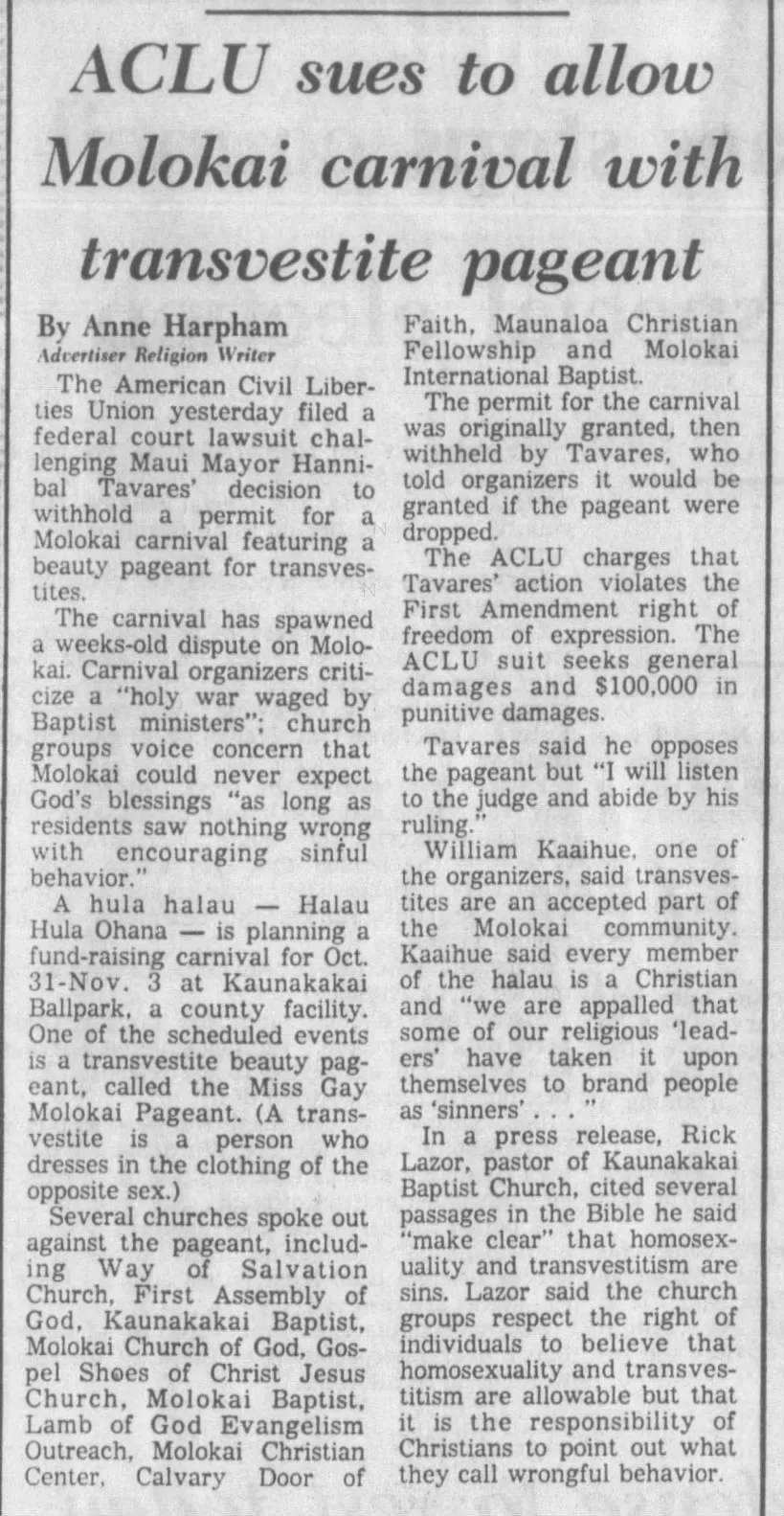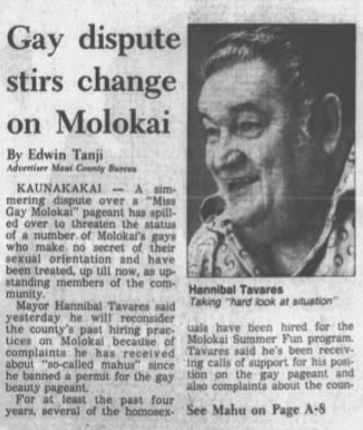
Miss Gay Molokaʻi Pageant 1985
In the summer of 1985, kumu hula William Kaaihue was making preparations for a permitted festival in Molokaʻi’s Kaunakakai Ballpark to raise funds for his Halau Hula ‘Ohana.
The permit was revoked by then-Maui County Mayor Hannibal Tavares after several churches on Molokaʻi spoke out against one of the festival’s main events, the Miss Gay Molokaʻi Pageant. In a press release, Rick Lazor, pastor of Kaunakakai Baptist Church, cited several passages in the Bible that he said “make clear” that homosexuality and transvestitism are sins. Lazor also said that it is the responsibility of Christians to point out what they called “wrongful behavior.”
According to a June 10, 1985 article on the controversy in the Honolulu Advertiser, pictured at right, Kumu Kaaihue said that māhū are an accepted part of the Molokaʻi community. Noting that “every member of the halau is a Christian,” Kaaihue said that “we are appalled that some of our religious ‘leaders’ have taken it upon themselves to brand people as ‘sinners’ …”
Not willing to let a “holy war waged by Baptist ministers” ruin the festival, Kumu Kaaihue, represented by ACLU of Hawai’i lawyers Dan Foley and Karen Holt, filed a federal lawsuit challenging Mayor Tavares’ decision to revoke the permit.
On June 22, 1985, it was reported in a Honolulu Advertiser article, pictured below, that U.S. District Judge Harold Fong ruled that the pageant was protected by constitutional freedoms of expression and ordered the Maui County government issue the permit and let the show go on as planned.
Under the headline “Gay dispute stirs change on Molokai,” an October 18, 1985 article in the Honolulu Advertiser, pictured at right and below, said that “a simmering dispute over a ‘Miss Gay Molokai’ pageant has spilled over to threaten the status of a number of Molokai’s gays who make no secret of their sexual orientation and have been treated, up till now, as upstanding members of the community… Mayor Tavares said he will reconsider the county’s past hiring practices on Molokai because of complaints he has received about ‘so-called mahus’ since he banned a permit for the bay beauty pageant.”
The article continued: “Possibly the best known homosexual on Molokai, Butchie Dudoit last year received the Aloha Spirit award from the Molokai Chamber of Commerce for doing volunteer work, including work with several county and state programs.”
“It’s all been changed with the simmering fight over the attempt to ban the pageant,” Dudoit said.
“On our island the mahus were accepted. There were no hard feelings. Everybody was nice to one another. Even the church people accepted us. But now, there is a tension and even the local people started shying away from us,” Dudoit said. “It’s creating a conflict on the island.”
While the case resulted in a mostly-favorable outcome for the halau - under the court order drafted by the ACLU, the festival’s sponsors “will screen the stage so the contestants cannot be seen from outside the park or from a public road” - several newspaper articles published in the midst of the controversy revealed differing views in the community.
For at least four years, the paper reported, “several of the homosexuals have been hired for the Molokai Summer Fun Program” and Mayor Tavares said he had “a right and a responsibility to look at the qualifications, the attitudes and the lifestyle of who gets hired. I will take a good hard look at the situation.”
This same article also reported that “for years, Molokai has been known as a community that accepted its known homosexual population. Only newcomers were sometimes surprised at finding an openly flagrant ‘mahu,’ usually a man dressed as a woman.”
Photo of Moana ʻButchieʻ Dudoit, Molokaʻi Dispatch
A few weeks later, after the dust from the brouhaha stirred by the churches and Mayor Tavares had settled, the festival, and the pageant, went on as planned.
In a November 2, 1985 Honolulu Advertiser article titled “’G-rated’ pageant fails to daunt Molokai,” pictured below, reporter Rick Carroll wrote: “If anyone expected a lightning bolt to split the town in two, they were disappointed. This hot and dusty little town [of Kaunakakai] appears – so far – to be surviving its first gay pageant with aplomb and sophistication.”
Story contributed by Joe Wilson
The articles below appeared in the Honolulu Star-Bulletin and Honolulu Advertiser on the weekend the pageant took place.










